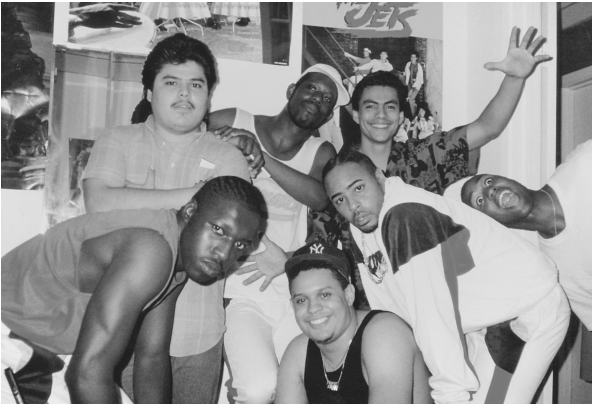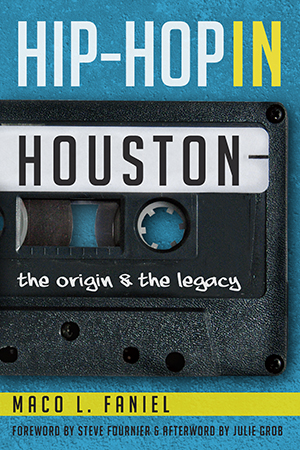
While Austin is the Live Music Capital of the World, its big sister, Houston, is the historic heart of Texas music. For decades, amateur blues and jazz musicians went to Houston to make it big, and established acts came to Bayou City studios to cut records. In a city as large as Houston, multiple generations of performers and audiences built the music culture and created a laboratory for musical innovation. Beginning in the 1980s, hip-hop developed new styles, its own unique culture, and unforgettable performers — in Houston.
Rap-A-Lot Records
If hip-hop culture is all about geography, then the East Coast and West Coast are nothing like the Gulf Coast. The so-called Third Coast found its voice in the 1980s, when Houston’s Rap-A-Lot record label was founded. James Smith founded Rap-A-Lot in 1986 after meeting up-and-coming teens Keith Rogers and Oscar Ceres and decided to back them financially. Rap-A-Lot broke through to the mainstream with the Geto Boys, and while they were on the road repping Houston, Rap-A-Lot signed on more acts, including Choice, The Convicts, O.G. Style and The Terrorists. There were many rappers and groups that began to record hip-hop music around 1985–86, but Rap-A-Lot and its most prominent group, the Geto Boys, kicked down doors so that outsiders could hear what was special about Houston. By 1991, Houston, with its many nightclubs, was exposing thousands to hip-hop culture on a weekly basis and serving as the training ground for future rappers. It had established itself as a hip-hop city.
Kidz Jamm
In 1981, Texas Southern University’s KTSU general manager Charles Porter launched a weekly radio program for his high school–aged children. The weekend show centered on youth music and culture. Kidz Jamm played R&B and pop music, as hip-hop music was still not widely available. When high school student Lester “Sir” Pace came to work for the show, that all changed. Few in Houston knew much about hip-hop, but Kidz Jamm proved to be a singular resource for young listeners of the small radio station. Throughout the 1980s, it was school for many DJs, radio personalities, producers and even a few rappers. Along with the proliferation of new music in Houston’s large nightclubs, Kidz Jamm was also responsible for breaking new hip-hop music. And as the lone station in Houston playing hip-hop, KTSU and Kidz Jamm was instrumental in shaping Houston’s hip-hop culture.
Geto Boys
The Geto Boys, as developed and produced by James Prince, would become Houston’s first nationally recognized hip-hop group, on the strength of the group’s signature song, 1991’s “Mind Playing Tricks on Me.” The album, “We Can’t Be Stopped,” was the appropriate title; it also reflected the City of Houston’s own response to years of noise from haters and detractors. The Houston scene was something to be reckoned with. To that point, in 2012, Rolling Stone magazine ranked the paranoid hip-hop masterpiece “Mind Playing Tricks on Me” as the fifth-greatest hip-hop song ever.
DJ Screw
Hot on the heels of The Geto Boys, a young DJ named Robert Earl Davis Jr. began hawking his own mixtapes that would reinvigorate hip-hop and give Houston its own sound. Davis dubbed himself DJ Screw and perfected a technique where he rapped over slowed-down versions of existing songs — mostly Houston and West Coast rap, R&B, and funk and reggae. His new recipe would become known around the world as “chopped and screwed.” Screw’s influence grew following his death in 2000, and his style can still be heard in fellow Houston rappers Bun B, Pimp C, Paul Wall, Chamillionaire, and Slim Thug. And even Beyoncé herself acknowledged the musical legacy of chopped and screwed when her cut “Bow Down/I Been On” where she cemented her own royalty and repped Houston’s hip-hop legends, and even included verses from rappers Bun B, Scarface, Willie D, Lil’ Keke, and Z-Ro, with each giving props to Houston’s hip-hop history.

Hip Hop in Houston: The Origin and the Legacy
By Maco L. Faniel, Foreword by Steve Fournier & Afterword by Julie Grob
Rap-A-Lot Records, U.G.K. (Pimp C and Bun B), Paul Wall, Beyonce, Chamillionaire and Scarface are all names synonymous with contemporary hip-hop. And they have one thing in common: Houston. Long before the country came to know the chopped and screwed style of rap from the Bayou City in the late 1990s, hip-hop in Houston grew steadily and produced some of the most prolific independent artists in the industry. With early roots in jazz, blues, R&B and zydeco, Houston hip-hop evolved not only as a musical form but also as a cultural movement. Join Maco L. Faniel as he uncovers the early years of Houston hip-hop from the music to the culture it inspired.

